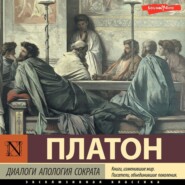По всем вопросам обращайтесь на: info@litportal.ru
(©) 2003-2024.
✖
Parmenides
Настройки чтения
Размер шрифта
Высота строк
Поля
Of course.
And the things which are other than the one will be many; for if the things which are other than the one were neither one nor more than one, they would be nothing.
True.
But, seeing that the things which participate in the one as a part, and in the one as a whole, are more than one, must not those very things which participate in the one be infinite in number?
How so?
Let us look at the matter thus: – Is it not a fact that in partaking of the one they are not one, and do not partake of the one at the very time when they are partaking of it?
Clearly.
They do so then as multitudes in which the one is not present?
Very true.
And if we were to abstract from them in idea the very smallest fraction, must not that least fraction, if it does not partake of the one, be a multitude and not one?
It must.
And if we continue to look at the other side of their nature, regarded simply, and in itself, will not they, as far as we see them, be unlimited in number?
Certainly.
And yet, when each several part becomes a part, then the parts have a limit in relation to the whole and to each other, and the whole in relation to the parts.
Just so.
The result to the others than the one is that the union of themselves and the one appears to create a new element in them which gives to them limitation in relation to one another; whereas in their own nature they have no limit.
That is clear.
Then the others than the one, both as whole and parts, are infinite, and also partake of limit.
Certainly.
Then they are both like and unlike one another and themselves.
How is that?
Inasmuch as they are unlimited in their own nature, they are all affected in the same way.
True.
And inasmuch as they all partake of limit, they are all affected in the same way.
Of course.
But inasmuch as their state is both limited and unlimited, they are affected in opposite ways.
Yes.
And opposites are the most unlike of things.
Certainly.
Considered, then, in regard to either one of their affections, they will be like themselves and one another; considered in reference to both of them together, most opposed and most unlike.
That appears to be true.
Then the others are both like and unlike themselves and one another?
True.
And they are the same and also different from one another, and in motion and at rest, and experience every sort of opposite affection, as may be proved without difficulty of them, since they have been shown to have experienced the affections aforesaid?
True.
1. bb. Suppose, now, that we leave the further discussion of these matters as evident, and consider again upon the hypothesis that the one is, whether opposite of all this is or is not equally true of the others.
By all means.
Then let us begin again, and ask, If one is, what must be the affections of the others?
Let us ask that question.
Must not the one be distinct from the others, and the others from the one?
Why so?
Why, because there is nothing else beside them which is distinct from both of them; for the expression 'one and the others' includes all things.
Yes, all things.
Then we cannot suppose that there is anything different from them in which both the one and the others might exist?
There is nothing.
Then the one and the others are never in the same?
True.
Then they are separated from each other?
Yes.
And we surely cannot say that what is truly one has parts?

















